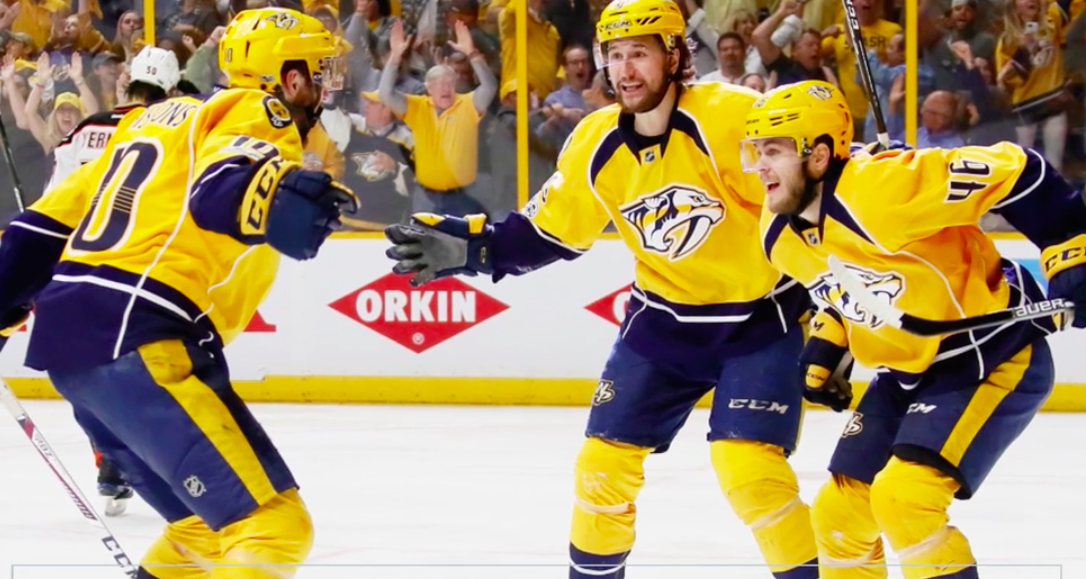
Hockey will never stick in Nashville.
This was my thinking on October 10, 1998, when an official first dropped a puck for a Nashville Predators game at what was then known as Nashville Arena. The Preds lost that game, 1-0, to a team I considered equally misplaced in the National Hockey League (the Florida Panthers). Hockey was a sport — the sport — loved most above our northern border, in Canada, where the Toronto Maple Leafs, Montreal Canadiens, and Edmonton Oilers established themselves across a land that made the “frozen tundra” of Green Bay, Wisconsin, feel balmy. Having spent nine winters in New England, I considered the Chicago Blackhawks and Detroit Red Wings geographic outliers and my team of choice, the St. Louis Blues, purely southern when it comes to pursuit of the Stanley Cup.
Hockey will never stick in Nashville.
This was my thinking when blurry memories of the Atlanta Flames (thanks to Ted Turner’s Superstation) entered my head. Among the most tastelessly named teams in sports history — think about it — the Flames burned out after only eight seasons in Georgia and moved so far away (Calgary, Alberta) that you had the impression a point was being made. The American South and hockey were, at best, a relationship destined for neglect. But the NHL is a stubborn suitor. An expansion franchise (the Thrashers) took the ice in Atlanta in October 1999. It lasted 11 years and can now be found in Winnipeg, Manitoba.
But hockey somehow stuck in Nashville. The Predators didn’t qualify for the NHL’s 16-team playoffs until their sixth season (2003-04), when their average attendance ironically bottomed out at 13,157. (Capacity at Bridgestone Arena for a Predators game is 17,113.) They reached the playoffs six of the next seven seasons, attendance climbing closer to 16,000 per game and with an actual star — defenseman Shea Weber — to sell hockey sweaters to people more accustomed to leather vests or football jerseys.
And the hockey-Nashville marriage has the legitimacy of the mighty dollar behind it. The median ticket price for a Predators game this season was $119 (according to vividseats.com), the ninth highest in the NHL. (Believe it or not, the Winnipeg Jets were seventh, with a price of $136.) NHL clubs aren’t as deep in television revenue as those in the NBA or NFL. Hockey still relies on that quaint variable — the ticket-buying public — for profitability. And there is a large ticket-buying public with pucks on the brain in middle Tennessee. The Predators averaged 17,159 tickets sold this season, meaning a sellout (and then some) for 41 home games.
Hockey has stuck in Nashville, and Tennessee’s capital will now see slap shots and glove saves in June. With their six-game win over the Anaheim Ducks in the Western Conference finals, the Predators will face either Pittsburgh or Ottawa for the most glorious trophy in North American sports. Like it or not Grizzly fans and Titan fans, the most famous pro athletes in Tennessee the next two weeks will be P.K. Subban (the Preds’ star defenseman) and Pekka Rinne (their Finnish goalie). Should Nashville prevail in the final series, the Predators will become the first team from the Volunteer State to claim a championship in one of this continent’s four major team sports.
There are surely hockey fans in British Columbia and Quebec still thinking (if silently), “Hockey will never stick in Nashville.” Canada has gone Cupless now for 24 years, since Montreal raised Lord Stanley’s chalice in 1993. Since then, Tampa Bay has won the Cup (2004, over Calgary), as have the Carolina Hurricanes (2006, over Edmonton), Anaheim Ducks (over Ottawa, in 2007), and Los Angeles Kings (twice). It turns out the only frozen requirement for a Stanley Cup champion is the ice rink itself.
Memphis and Nashville will continue to be rivals, whether or not it’s productive for the state of Tennessee. The Grizzlies may not interest someone in country music’s heartland, and this means little to regulars at FedExForum. Likewise, most Memphians will be checking the NBA Finals schedule while the Zamboni machine does its thing 200 miles east. But Tennessee is four Predator wins from becoming the 12th American state to claim the Stanley Cup. Tighten your laces, boys.